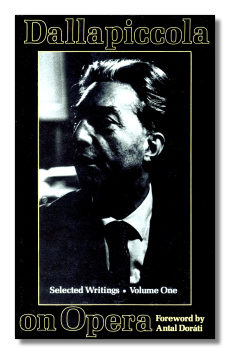
The Internet's Premier Classical Music Source
Related Links
-
Introduction
Acoustics
Ballet
Biographies
Chamber Music
Composers & Composition
Conducting
Criticism & Commentary
Discographies & CD Guides
Fiction
History
Humor
Illustrations & Photos
Instrumental
Lieder
Music Appreciation
Music Education
Music Industry
Music and the Mind
Opera
Orchestration
Reference Works
Scores
Thematic Indices
Theory & Analysis
Vocal Technique
Search Amazon
Recommended Links
Site News
 Book Review
Book Review
Dallapiccola on Opera

Selected Writings of Luigi Dallapiccola
Volume One
Rudy Shackelford, editor and translator
Foreword by Antál Doráti
London: Toccata Press. 1987. 291 pp
ISBN: 0907689094
Also available directly from publisher.
Up to reading this book, I had known Dallapiccola only through his music – not bad, since I regard Dallapiccola as the great Italian composer after Puccini and probably the finest instrumental composer Italy has ever produced. For some reason, very few in the United States – even very few modern music fanatics – know his music, and major works remain unavailable on compact disc. The opera Volo di Notte (Night Flight, after the book by French novelist Saint-Exupéry), as far as I know hasn't had a professional production in the U.S. I happened to be lucky enough to catch a European production around the time of Dallapiccola's death – a performance that convinced me not only of the worth of the opera, but of Dallapiccola's high stature as an opera composer. I can't even think of a professional American venue liable or even able to stage his works with the attention they deserve. It's our loss and a sign of the mindless consumerism that afflicts our opera life.
Like most major opera composers, Dallapiccola to some extent redefines the genre. His approach to opera is "poetic" rather than "realistic," but it remains dramatic. That is, despite elliptical storytelling techniques (the composer wrote all his own libretti), you still have the virtues of conflict put between a character and his goal. The fact that Dallapiccola served as his own librettist – and with far greater literary distinction than the librettist-composer Tippett, by the way – never really registered on me before. Consequently, the level of distinction this essay collection consistently achieves both delighted and surprised me.
Dallapiccola is especially valuable in showing the links he himself has uncovered between libretto and music and for his profound understanding of and familiarity with opera heritage. Highpoints include a brilliant dramatic analysis of Don Giovanni and a tour-de-force essay on how the terzetto influences the entire dramatic structure of Verdi's mature operas. In addition, the collection includes loving appreciations of Ravel's enchanting L'Enfant et les Sortilèges, Monteverdi's Il Ritorno di Ulisse in Patria, Strauss's Salome, Verdi's Falstaff, and the 20th-century Italian composer Malipiero. His comments on the genesis of the libretti of Volo di Notte, Job, and his late masterpiece Ulisse show him solving structural and dramatic problems with – not ease, exactly; Dallapiccola lets you know that he works long and hard – but with a successful concern for finding the right solution. Consider the problem of fitting the twenty-four books of Homer's Odyssey into an evening in the theater. Dallapiccola's solution is masterful. It's a pleasure to spend time with a mind like his.
Dallapiccola was one of the most widely-read of composers. For example, he confesses to "stealing" a line from Machado for Ulisse. How many non-Spanish speakers even know Machado's name, let alone read him? References to Dante, Cavafy, Hölderlin, Joyce, and Proust, among others, pepper his essays. Contrary to what you might expect, the references illuminate Dallapiccola's point, rather than merely show off how much he's read. The man has a vivacious, energetic mind and voice. I would say the essays would appeal to an intelligent reader, not necessarily conversant in the minutiae of musical technique, but that the ability to read music would enhance one's pleasure in some of them. Dallapiccola, impressively, wants to talk to the rest of us, not just musical priests and acolytes.
Editor and translator Rudy Shackelford has done a first-class job all around. It's real English, folks, not translatorese. The essays are complex enough to require triple and quadruple checking from an editor, and the notes (I assume those not explicitly labelled as Dallapiccola's are by Shackelford) are unfailingly illuminating. Furthermore, the poetry translations are as fine as the prose.
For those interested, I recommend the following Dallapiccola discography:
- Canti di prigionia; Il Prigioniero; Salonen; Sony SK68323
- Concerto per la Notte dell'Anno; Thome; Vox CDX5144
- Piccola musica notturna; Australia Ensemble; Entr'acte ESCD6504
- Prima serie dei cori di Michelangelo; Rosenbaum; CRI 615
- Ulisse; Maazel; Stradivarius STR10063
Copyright © 1997, Steve Schwartz.


















